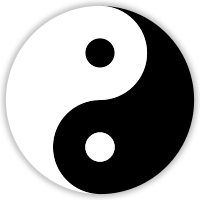|
Home: Religion: Taoism: Core Beliefs.
Taoism Core Beliefs
 Taoism has never been a unified religion, but has rather consisted of numerous teachings based on various revelations.
|
|
![]()
Branches of TaoismDifferent branches of Taoism often have very distinct beliefs. Nevertheless, there are certain core beliefs that nearly all the sects share.Principles Taoist theology emphasizes various themes found in the Daodejing and Zhuangzi, such as naturalness, vitality, peace, "non-action" (wu wei, or 'effortless effort'), emptiness (refinement), detachment, flexibility, receptiveness, spontaneity, the relativism of human ways of life, ways of speaking and guiding behavior. Tao The word "Tao" is usually translated as road, channel, path, way, doctrine, or line. Wing-tsit Chan stated that Tao meant a system of morality to Confucianists, but the natural, eternal, spontaneous, indescribable way things began and pursued their course to Taoists. Hansen disagrees that these were separate meanings and attributes. Cane asserts Tao can be roughly stated to be the flow of the universe, or the force behind the natural order, equating it with the influence that keeps the universe balanced and ordered. |
 A Taoist Temple in Taiwan, showing elements of the Jingxiang religious practice and sculptures of Dragon and Lion guardians. |
 Martinson says that Tao is associated with nature, due to a belief that nature demonstrates the Tao. The flow of qi, as the essential energy of action and existence, is often compared to the universal order of Tao. Tao is compared to what it is not, which according to Keller is similar to the negative theology of Western scholars. It is often considered to be the source of both existence and non-existence. LaFargue asserts that Tao is rarely an object of worship, being treated more like the Indian concepts of atman and dharma.
Martinson says that Tao is associated with nature, due to a belief that nature demonstrates the Tao. The flow of qi, as the essential energy of action and existence, is often compared to the universal order of Tao. Tao is compared to what it is not, which according to Keller is similar to the negative theology of Western scholars. It is often considered to be the source of both existence and non-existence. LaFargue asserts that Tao is rarely an object of worship, being treated more like the Indian concepts of atman and dharma.
De (Te)
Tao is also associated with the complex concept of De (德) "power; virtue; integrity", that is, the active expression of Tao. De is the active living, or cultivation, of that "way".
De is a key concept in Chinese philosophy, usually translated "inherent character" or "integrity" in Taoism, "moral character" or "virtue" in Confucianism and other contexts, and "merit" in Chinese Buddhism.
For more information about De, see this article: Wikipedia De.
Wu Wei
Wu wei (simplified Chinese: 无为; traditional Chinese: 無爲; pinyin: wúwéi) is a central concept in Taoism. The literal meaning of wu wei is "without action". It is often expressed by the paradox wei wu wei, meaning "action without action" or "effortless doing". The practice and efficacy of wu wei are fundamental in Taoist thought, most prominently emphasized in Taoism. The goal of wu wei is alignment with Tao, revealing the soft and invisible power within all things. It is believed by Taoists that masters of wu wei can observe and follow this invisible potential, the innate in-action of the Way.
In ancient Taoist texts, wu wei is associated with water through its yielding nature. Water is soft and weak, but it can move earth and carve stone. Taoist philosophy proposes that the universe works harmoniously according to its own ways. When someone exerts his will against the world, he disrupts that harmony. Taoism does not identify man's will as the root problem. Rather, it asserts that man must place his will in harmony with the natural universe.
P'u
P'u translates to "uncarved block", "unhewn log", or "simplicity". It is a metaphor for the state of wu wei (無爲) and the principle of jian. It represents a passive state of receptiveness. P'u is a symbol for a state of pure potential and perception without prejudice. In this state, Taoists believe everything is seen as it is, without preconceptions or illusion.
P'u is usually seen as keeping oneself in the primordial state of tao. It is believed to be the true nature of the mind, unburdened by knowledge or experiences. In the state of p'u, there is no right or wrong, beautiful or ugly. There is only pure experience, or awareness, free from learned labels and definitions. It is this state of being that is the goal of following wu wei.
![]()
Spirituality
Taoists believe that man is a microcosm for the universe. The body ties directly into the Chinese five elements. The five organs correlate with the five elements, the five directions and the seasons. Akin to the Hermetic maxim of "as above, so below", Taoism posits that man may gain knowledge of the universe by understanding himself.
In Taoism, even beyond Chinese folk religion, various rituals, exercises, and substances are said to positively affect one's physical and mental health. They are also intended to align oneself spiritually with cosmic forces, or enable ecstatic spiritual journeys. These concepts seem basic to Taoism in its elite forms. Internal alchemy and various spiritual practices are used by some Taoists to improve health and extend life, theoretically even to the point of physical immortality.
Parts of the above article are licensed under the GNU Free Documentation License. It uses material from Wikipedia. Images courtesy FCIT
![]()
Copyright Important.ca ©. All rights reserved.
